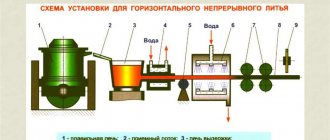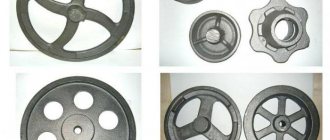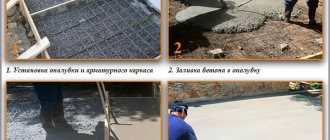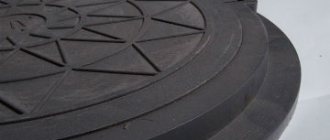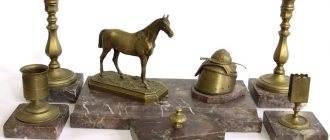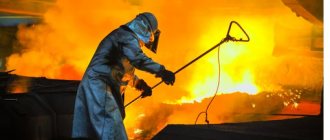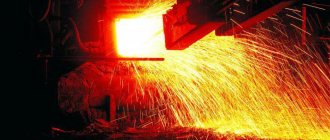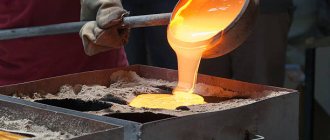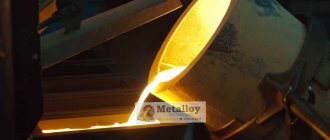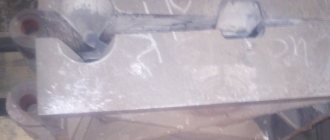Home / Cast iron from gray, malleable, alloy cast iron to order.
The process of manufacturing various products, during which a material in a liquid state turns into a solid (casting formation), is called “casting”. Iron casting, which is a method of producing cast iron products, has become widespread in various fields of activity. In fact, in order to produce any part from this material, casting is the only way. Castings for stoves are in high demand: cast iron elements are used both to ensure their functionality and as decoration.
Functionality and features of cast iron
Cast iron, which is used for the production of castings (technological products and artistic elements), is divided into several types. Thus, there is high-strength cast iron (in some cases it acts as an alternative to steel), as well as gray, white and malleable cast iron. In addition, there are special grades of this material, but they are not used in cast iron foundries (their purpose is to use them as alloying additives in steel).
Various methods are used to create cast iron castings. Thus, one of the most common is casting in sand-clay mixtures. Cold-hardening mixtures (CMC) can also be used. The production process itself involves pouring material in a liquid state into hollow molds. After it has completely hardened, the resulting product is removed and subjected to the necessary mechanical processing.
CJSC "Special Machine Building Plant "Mayak" produces high-density cast iron casting using the cold casting method. Castings made by this method have an attractive appearance, there are no blockages or sinkholes. Deliveries are made to enterprises in the engineering, metallurgical, energy, and machine tool industries.
It should be noted that casting is a complex technological process, the results of which are influenced by many factors. Of course, it is impossible to obtain a high-quality product without high-tech equipment, but the level of qualifications of specialists and the availability of product quality control at each stage of production are also of utmost importance. In addition, only strict adherence to technology can eliminate the risk of voids (in cast iron casting this is considered the main disadvantage).
The main advantages of cast iron are practicality, strength, long service life and safety. The attractive appearance of the products is of no small importance for many customers. The affordable price of cast iron is also considered an advantage, which significantly reduces the final cost of the products.
The production of cast iron is in demand in many areas. Products are used in mechanical engineering and machine tool building, mining, construction industry, as well as to solve various problems in other industries. And, of course, there is an increased demand for artistic casting: along with strength and wear resistance, such products are distinguished by impeccable aesthetic characteristics. The method is suitable for creating stair railings, lanterns, gazebos and all kinds of small architectural forms.
Production of high-quality iron castings for machine tools and complex body iron castings
(frames, housings) by the casting method in the cold steel system particularly distinguishes our enterprise, especially considering that we have the ability to carry out complete machining of these products, taking into account all the requirements for accuracy and roughness.
In the production of machine-made cast iron castings we mainly use the following alloys: SCh20, SCh25, SCh30, VC45, VC50, VC60. If necessary, it is possible to introduce alloying elements. Castings must undergo heat treatment to relieve internal stresses - artificial aging (the thermal section has large furnaces with dimensions of 7000x7000x14000mm). Without this heat treatment, during the operation of products, deformations may occur that exceed the requirements of the drawing in terms of possible deviations from flatness, parallelism and perpendicularity. 3D scanning can be used to control the dimensions of castings with complex configurations. EXAMPLES OF OUR WORK (PHOTO GALLERY)
Types of cast iron and their melting abilities
Different grades of alloy have different casting capabilities.
Perhaps the lowest labor intensity is found in casting gray cast iron. It is characterized by excellent fluidity, a small percentage of shrinkage and the ability to melt at low temperatures. Equipment housings, including machine tools, and engine components are produced from this type of material. In these devices, gray cast iron solves its problems, but stretching and any other deformations are contraindicated for it, since it is quite fragile. If the strength of the product is primarily important for casting cast iron according to drawings, choose an alloy of the VChShG brand. Graphite inclusions are contained in it in the form of balls. It is this brand of cast iron that is used in the production of rolled pipes and fittings for them, as well as parts that can withstand heavy loads in mechanisms.
IRON CASTING AND BASIC PRODUCTION TECHNOLOGIES
Cast iron casting in sand-clay mixtures
- Dimensional accuracy class for cast iron according to GOST R 53464-2009: 9-14
- Surface roughness of cast iron castings according to GOST 2789-73 Ra = 80-100 microns
- The minimum wall thickness obtained when casting cast iron is 3 mm
- Weight of castings from 0.5 kg to 40 tons
Cast iron casting in liquid-glass mixtures (ZhSS) and cold-hardening mixtures (CHS)
- Dimensional accuracy class for cast iron according to GOST R 53464-2009: 8-13
- Surface roughness of cast iron castings according to GOST 2789-73 Ra = 40-100 microns
- The minimum wall thickness obtained when casting cast iron is 3 mm
- Weight of castings from 0.5 kg to 40 tons
Characteristics of our iron casting production
- Area of the main foundry: 18,000 sq. m;
- Production capacity of the iron casting workshop: 24,000 t/year;
- Manual parade ground: 2000 sq. m;
Furnaces used for heat treatment:
- 2 furnaces with a load of 25 tons have working dimensions: B=2500 mm, H=1850 mm, L=5500 mm
- 2 furnaces with a load of 100 tons, with working dimensions: B=7000 mm, H=7000 mm, L= 14000 mm
Production time, level of complexity, guarantee for cast iron
- We will produce model equipment in 3 days;
- Production time for finished castings is from 5 days;
- We can produce thin-walled body parts, complexity group 6;
- We carry out laboratory tests (controlled parameters: chemical composition, yield strength, tensile strength, impact strength), and at the customer’s request we provide the results of fluoroscopy, ultrasonic flaw detection, magnetoscopy.
What is metal casting and how can you make money from it?
Casting is one of the methods of processing various metals. With it you can create objects of different sizes and configurations. This is the simplest and most affordable method, which is carried out using special equipment. Now many manufacturers offer mini construction.
Mini foundry
This means that an individual project of the production complex will be developed, the layout of the workshops, the placement of equipment, and the provision of all necessary communications.
Why is it beneficial to pay attention to ready-made turnkey complexes? Because:
- manufacturers accurately calculate the required production area;
- place communications as efficiently as possible;
- provide a full range of equipment setup services;
- By purchasing, you can immediately begin the production process.
Technical characteristics of foundry equipment
If the choice is made in favor of such a complex, then the next step in organizing a business will be to search for customers. Die-cast metal products are in great demand in almost all industries:
Sheet metal bending
- machine tool industry;
- automotive industry;
- instrument making;
- production of household appliances;
- shipbuilding;
- production of medical and dental equipment;
- jewelry art;
- production of home and garden decor items;
- construction materials industry.
The advantages of a mini-factory are its compact size and the ability to produce products in small batches. Often large enterprises are forced to refuse small wholesale customers, since reconfiguring equipment is quite problematic.
A mini-factory is an automated complex: in order to switch to a new type of manufactured products or metal blanks, you only need to make changes to the software package and make new molds. And the cost of non-standard parts made to order is several times higher than standard production.
Foundry
Another advantage of the mini ones is that they are designed so that they can process all types of metals, while the large-scale lines have separate workshops for this.
Cast iron alloys used and cost of castings
- Gray cast iron GOST 1412-85: SCh10, SCh15, SCh20, SCh25, SCh30, SCh35 from 102 rubles/kg;
- High-strength cast iron according to GOST 7293-85: VC40, VC45, VC50, VC60 from 135 RUR/kg;
- Special types of cast iron, alloyed cast iron according to GOST 7769-82: ChH1, ChH16M2, ChH16 from 170 RUR/kg, ChH28N2, ChH28 from 360 RUR/kg, ChH32 from 380 RUR/kg, ChS5 from 125 RUR/kg, ChS5Sh, etc.;
- Anti-friction cast iron according to GOST 1585-85: AChS-1, AChS-3, AChS-5 from 142 rubles/kg, etc.
- It is possible to cast cast iron from the customer’s choice of grades
*** Prices are indicated for 1 kg of castings including VAT
Foundry production of gray cast iron castings, mechanical processing
One of the most famous types of alloy is the so-called gray cast iron.
In addition to the traditional main components - iron and carbon - it also contains plate-shaped graphite. Thanks to it, the fractured material acquires a characteristic gray color. The carbon content in this cast iron reaches a minimum of 2.4, maximum of 4.2%. It is the inclusion volume that determines the mechanical characteristics of the alloy, which the cast iron foundry must take into account. Due to its high fluidity, gray cast iron is suitable for casting products of complex shapes. It is relatively cheap and has an aesthetic appearance. Low wear allows it to be used in the assembly of components and mechanisms. But the material also has the disadvantage of low bending strength, and therefore increased fragility. True, this minus is compensated by high compressive strength.
The brittleness of the alloy places increased demands on its mechanical processing. For a long time, welding was considered impossible for gray cast iron. However, technologies have emerged that still make it possible to make permanent welded joints from it. This becomes possible if the workpiece is preheated.
Where to order cast iron?
Services for the production of custom-made iron castings in Moscow and the Moscow region are offered by ZAO Mayak Special Machine Building Plant. Available production capabilities allow us to produce castings weighing up to 40 tons. In this case, various cast iron alloys are used to make castings. Also among the advantages of cooperation with JSC “Special Machine Building Plant “Mayak”:
- quality guarantees of manufactured products (all products comply with GOST requirements and undergo laboratory tests);
- the use of various technologies depending on the customer’s needs;
- minimum production time;
- professionalism and significant work experience, allowing you to solve problems of any level of complexity;
- favorable pricing policy.
Any questions? Employees of ZAO Special Machine Building Plant Mayak are ready to advise on all aspects of ordering castings.
Application of cast iron products
In addition to parts of mechanisms, machine tools, and cars, cast iron is used for the manufacture of artistic structures, fences, fences, monuments and busts. Products are made to order. Cast iron does not rust, withstands high temperatures well, therefore it is used for the manufacture of grates for furnaces, valves, dampers, and for the manufacture of heating boilers.
It is impossible not to mention Kasli and Kusa casting: a folk craft in the Southern Urals, artistic products made of cast iron with a three-century history.
Aluminum casting
The most common orders for casting are in Moscow, casting parts from Silumin
- Double Al-Si with a small magnesium content (alloys AK12, AK9, AK7). The alloys have good casting characteristics and high corrosion resistance. The mechanical strength of finished parts made from alloys of these groups can increase with heat treatment
- Silumins with copper (alloys AK5M2, AK5M and others). In terms of casting characteristics and corrosion resistance, such alloys are not inferior to the previous group, but a sufficiently high copper content improves mechanical strength, machinability, and heat resistance, which makes the material more versatile.
- Silumins with the addition of nickel (AK21M2, AK12MMgN and other alloys). Hypereutectic and eutectic silumins containing nickel and copper have a low coefficient of thermal expansion and high heat resistance.
- Aluminum-silicon alloys. The material has good technological and mechanical properties and fairly good corrosion resistance. ❌ Heat resistance is a disadvantage. The main area of application of such casting alloys from secondary aluminum is the production of complex castings for transport and other areas of mechanical engineering.
Production of foundry products from cast iron
The production of cast iron has almost the same wide application as the production of rolled steel. It is in demand:
- in heavy industry;
- in the assembly of machines and units;
- in the automotive industry;
- in the manufacture of kitchen utensils. Cast iron frying pans, cauldrons, pots are still not inferior to Teflon-coated dishes;
- in the production of household items. In massive cast iron bathtubs, the water cools much more slowly than in acrylic ones;
- in the creation of interior items: figurines, candlesticks, etc.
Brass casting
For casting we use lead, manganese-iron, manganese-aluminum, manganese-lead, aluminum, aluminum-iron-manganese, silicon, silicon-lead
- LTs14K3S3 - bearings, bushings
- LTs16K4 complex housings Temperatures up to 250°C
- LTs23A6Zh3Mts2 - antifriction parts (pressure screws, worm wheel rims)
- LTs40S, LTs40SD - injection molding of fittings (bushings, tees, adapters), bearing cages operating in fresh water or air.
